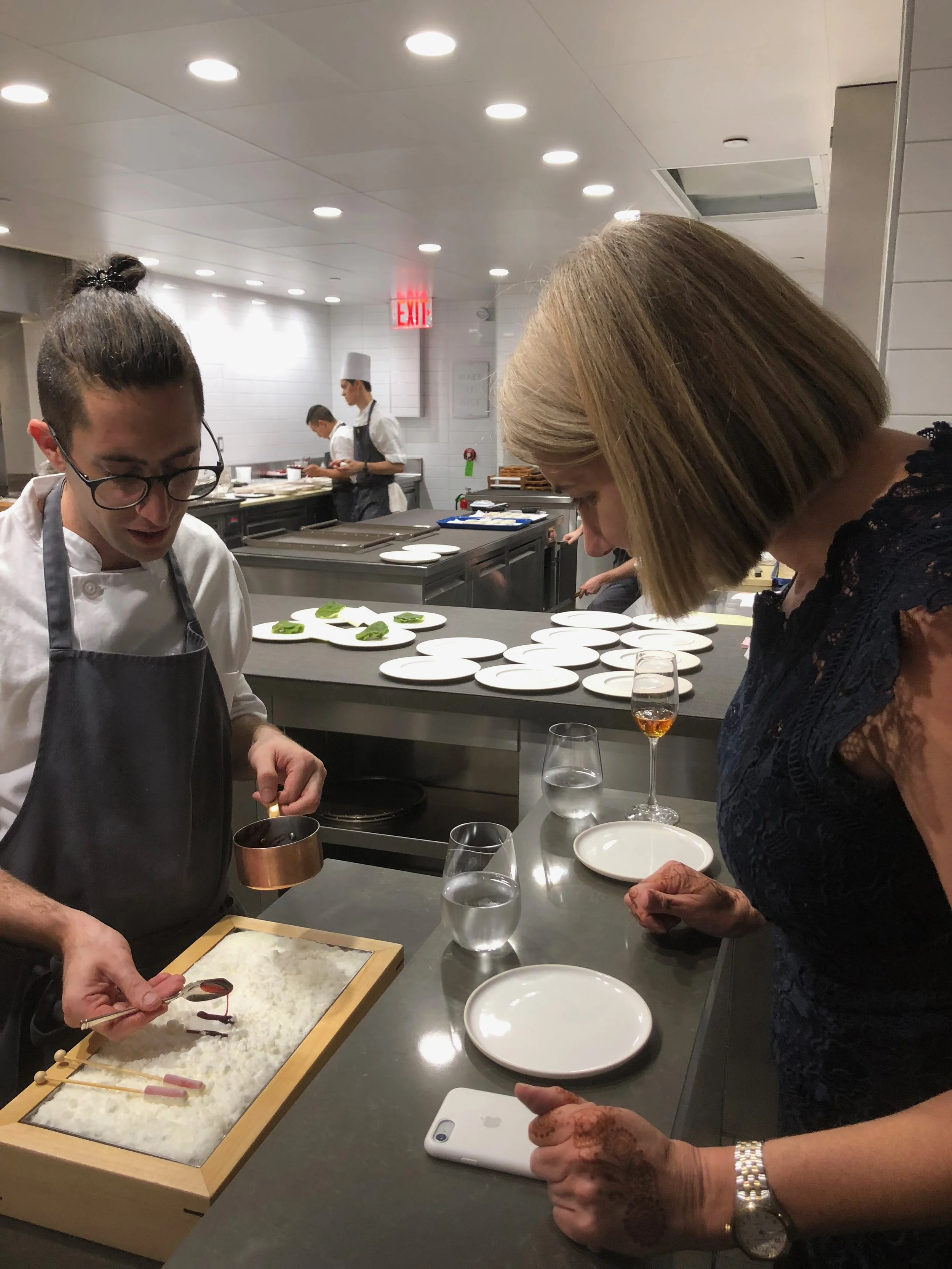Insights on Hospitality from Will Guidara's book, Unreasonable Hospitality
/The entrance to Eleven Madison Park
I’ve been fortunate to dine at restaurants all over the world and not one has made more of an impact on me and my views on hospitality than Eleven Madison Park in New York City. I started going there in 2015 and lost track of how many times I’ve been since. I’ve gone only once for the full experience in the dining room; the other times I’ve sat at the bar, and almost always intentionally solo.
Going to EMP became a personal ritual each time I went to New York City. Because it is usually impossible to get a reservation there, I would stand outside the locked revolving door until they opened it for service, just so I could secure one of the few seats at the bar. There’s something indescribable about the experiences I had there. It was equal parts ballet, creativity, education, and connection, rounded out with some sort of elusive voodoo magic. And many times that magical experience had nothing at all to do with the food — rather, it was about how they made me feel.
When I saw that Will Guidara (former co-owner of EMP) was writing a book, I immediately pre-ordered it. In Unreasonable Hospitality: The Remarkable Power of Giving People More Than They Expect, Guidara describes his personal and professional journey in the hospitality industry and shares insights and lessons from his time at Eleven Madison Park in partnership then with Chef Daniel Humm.
Guidara teases out principles of hospitality that can be applied across any field or profession. But as an events industry professional, the stories and lessons he shared resonated deeply with me. His book also gave me a glimpse into the complexity, planning, commitment to excellence, and precision that went into creating that mysterious magic I felt at EMP. The hospitality (different from service, as he eloquently points out) extended to me at each visit was clearly intentional and, as he puts it, unreasonable.
When I founded Rex & Regina Events I wanted to choose a name for the company that reflected my philosophy on events: creating a seamless, memorable, and intentional guest experience from invitation to exit. So many of the principles Guidara outlined reflect our commitment to that philosophy, starting with:
My first visit to EMP.. and my first cocktail there. (2015)
“Intention means every decision, from the most obviously significant to the seemingly mundane, matters. To do something with intentionality means to do it thoughtfully, with clear purpose and an eye on the results.”
We received the greatest compliment recently when a client wrote a review saying, “On our first phone call, Teresa asked me about what I wanted and who we were as a couple. From then on, she was always paying extreme attention to our vision.” Reading that was a confirmation that our approach to partnering with our clients is working — first, we listen, then we view every decision throughout the planning process through the lens of what we heard them say. We keep our client’s vision in the forefront and make intentional choices about each detail of the event. And details matter. As Guidaria points out:
“Many people don’t notice every single detail, but in aggregate, they are powerful.”
I’ve never worked with a client who says they want a cookie-cutter event. Who would? Each event should be personal—an authentic reflection of the host. That personalization comes from thoughtful consideration of each detail and touchpoint that the guest will experience. No, not every guest will notice the branded cocktail napkins on the bar or the fact that the signature cocktail was the one the couple drank on their first date, but they will absolutely leave with an overall impression that this was your event—not something formulaic that they’d been to a thousand times before.
My kitchen tour at Eleven Madison Park (2018)
Identifying and selecting those details does not happen on its own; it must be done with an intentional process, and the first step is looking at the budget and identifying the client’s priorities. Like any other investment, the budget for an event should be allocated according to the client’s priorities and the elements of the event that will make the most impact on their guests. For some, the priority might be an incredible menu, for others, it might be great music and a packed dance floor or watching their guests’ jaws drop when they walk into the room.
My clients that have even the healthiest of budgets often do not want their investment in the event to appear lavish or over the top. It doesn’t need to be, and in fact, I believe that throwing money at event details is often a sign that the process lacks intentionality, thoughtfulness, and creativity. And I could not agree more with Guidara when he says,
“Luxury means just giving more; hospitality means being more thoughtful.”
Thoughtful hospitality means always keeping in mind what the guests need, want, and appreciate. It reflects a genuine desire to care for each person that walks through the door. You can serve the impossible-to-find Pappy Van Winkle 25 but if your guests don’t like bourbon, you’ve failed.
I still dream of the Bread course at EMP! (2018)
Guidara’s book is not just for the hospitality industry. Instead, he points out that:
“Opportunities for hospitality exist in every business.”
Whether you are in finance, healthcare, real estate, or retail, every job has opportunities to care for and serve and surprise and delight your customers and clients. It just takes intention, and a focus on them, not on ourselves.
Guidara’s lessons and reflections reminded me of the privilege I have of impacting the lives of the people I work and partner with. And they challenged me to consider the ways in which I can extend hospitality to them in unreasonable ways.
As I was about to push that heavy revolving door to leave EMP one night, Will was standing nearby and asked me how my evening was. I briefly explained my EMP ritual and how I had gotten to know some of his team over the years. His question didn’t feel obligatory or formulaic. And I know now after reading Unreasonable Hospitality, that it was genuine — that he cared about my experience and how the team at the restaurant made me feel. And that is hospitality.





